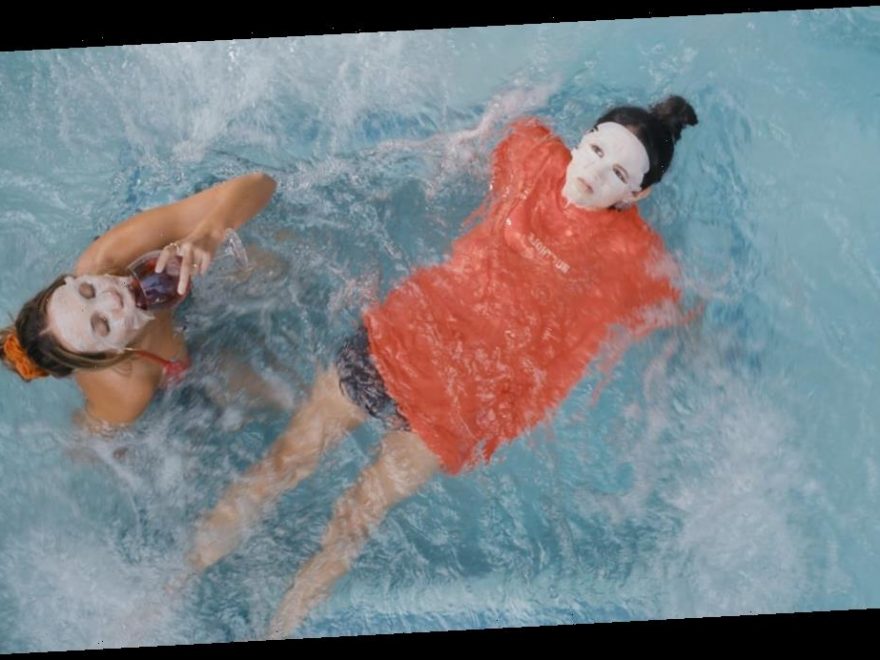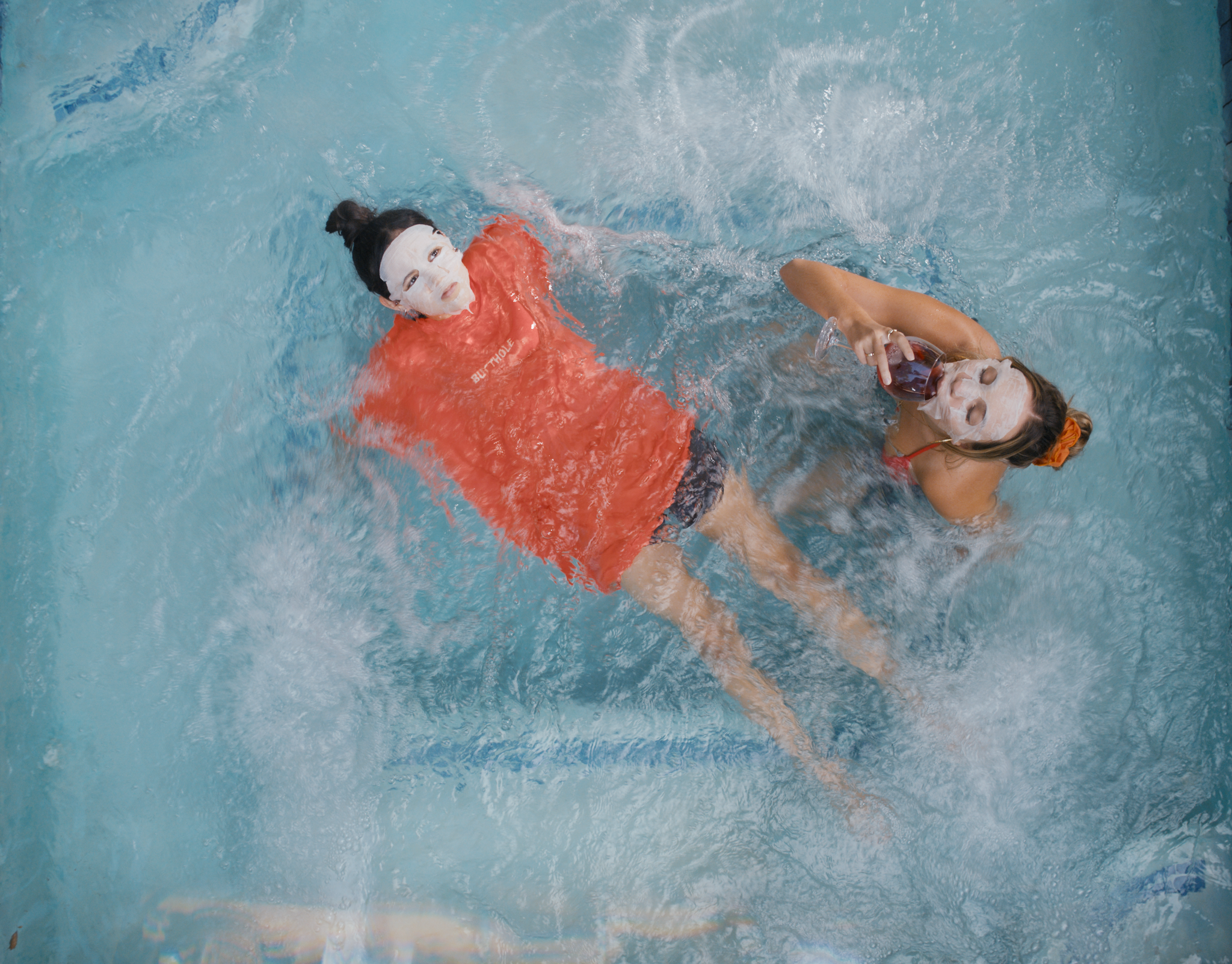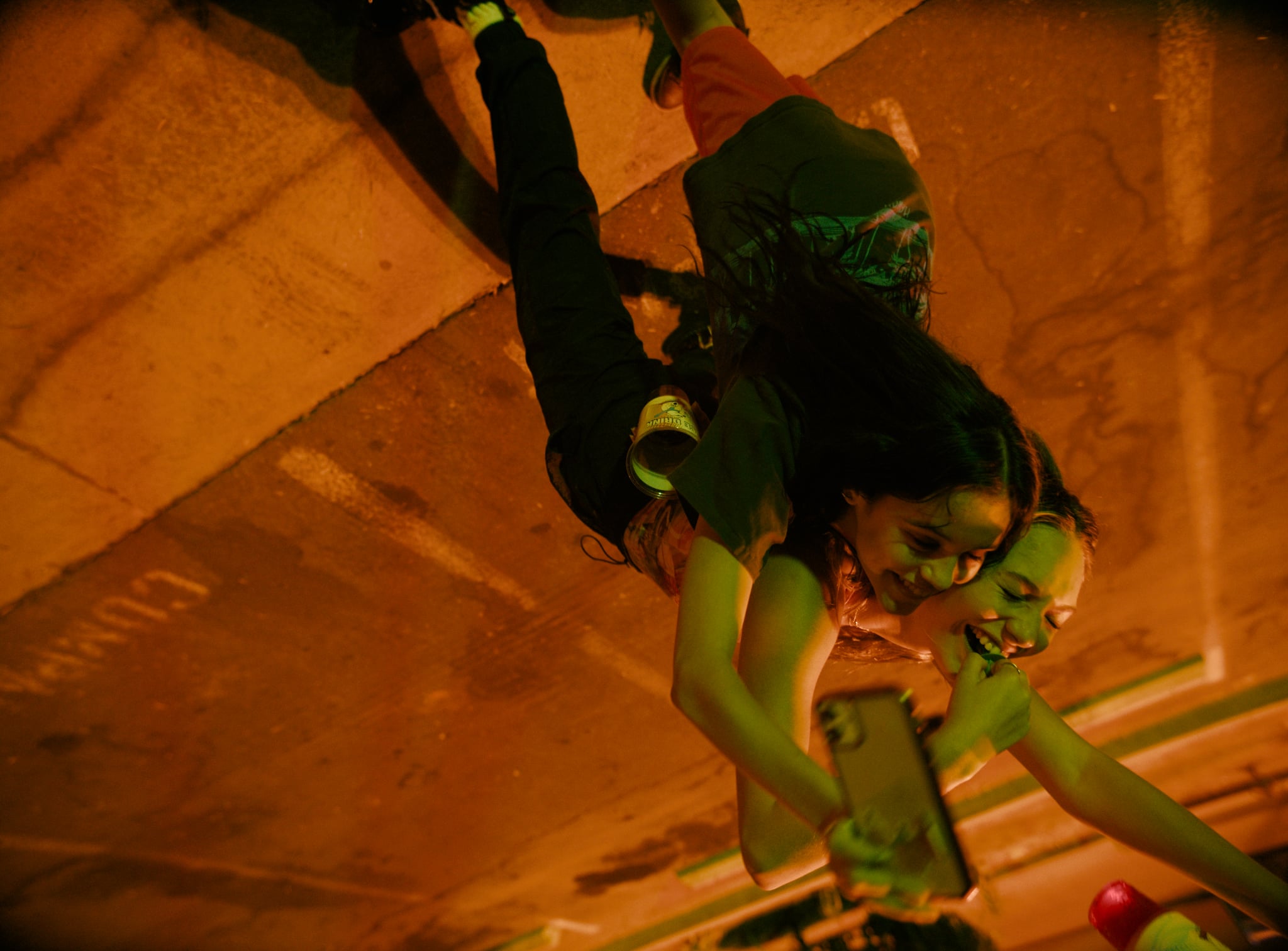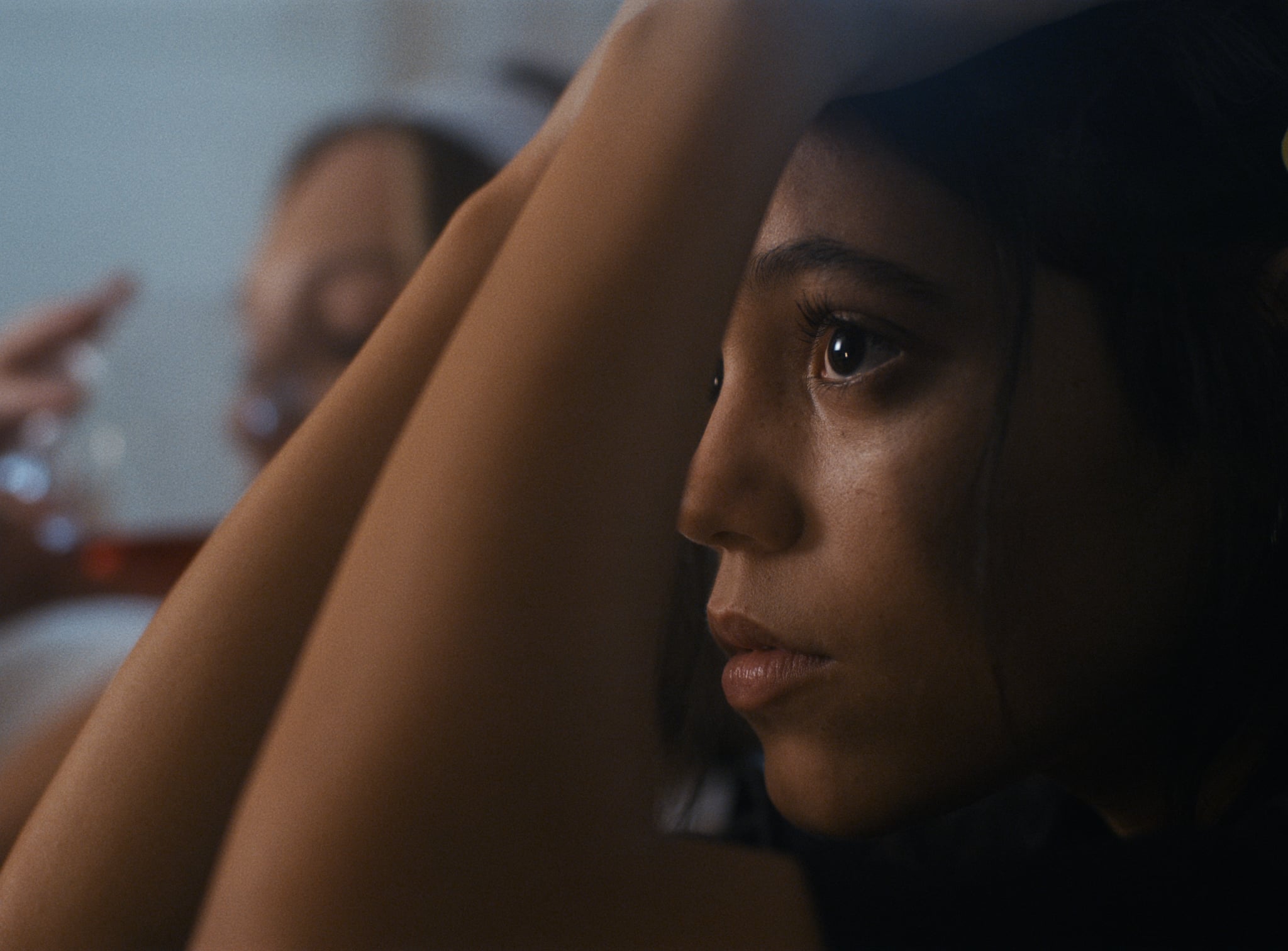What happens when a wave of immeasurable tragedy overtakes you? Do you sink, swim, or do you simply float? Megan Park’s film The Fallout examines this paradox from the perspective of Vada, a 16-year-old who survives a school shooting. POPSUGAR sat down with Park and actresses Jenna Ortega and Maddie Ziegler, to talk about the film following its SXSW premiere on March 17—just two days before the film took home the festival’s grand jury award.
Vada is introduced as a witty, bright-eyed, carefree teen, played to perfection by Yes Day‘s Ortega. She is the type who picks up Pumpkin Spice Lattes and cake pops with her best friend Nick before a mundane day at school. Except, the school day we meet Vada on is horrifyingly abnormal. She and Ziegler’s Mia happen to be in the bathroom when a student opens fire on their classmates outside.
The girls are practically strangers, but in that moment they become bonded in the most instinctual way. They hide in a stall together, feet propped atop the toilet bowl to avoid being seen from underneath. Gunshots echo in an otherwise silent scene, save only for the gasps of the teens as they stifle their cries. Vada types out a quick “I love you” text to her younger sister, a wrenching acceptance of fate. Niles Fitch’s Quinton rushes in, covered in blood, having just seen his brother murdered by the shooter. The trio emerges uninjured but not unscarred.
It’s a hold-your-breath type of scene, painful despite (thankfully) never showing gratuitous violence. And while Vada’s friend, Nick, is able to channel the experience into action — think Emma Gonzalez or David Hogg — Vada is simply trying to find her footing again. Her compassionate parents are full of worry, while her pre-teen sister Amelia is naive to the scope of what she went through. She struggles to articulate her emotions to her therapist, played by Shailene Woodley. Vada finds solace in the company of Mia and Quinton, all the while exploring drugs, alcohol, sexuality — normal experiences lensed through the eyes of a teen grappling with her own mortality.
Park knew this story, her first feature-length film, would need to be handled with an abundance of caution. She told POPSUGAR her “number one priority” was to avoid triggering anyone who carried the trauma of real experiences with them. Park grew up in Canada without anxiety of school shootings in her adolescence. She was hesitant to even pursue a project like The Fallout for fear it wasn’t her story to tell. However, she committed herself to research: documentaries, discussions, and panels among other personal records. “I talked to some organizations, Everytown being one of them,” she said. “They connected me with somebody who had been through a similar situation.
“I didn’t want to make it a true-life story or specific to one person, but I wanted to make sure that it did track emotionally,” she continued. “They were really great in providing me resources and to connect me with certain people to make sure that it wasn’t triggering and it did track. I wanted to make sure that it was true to that because I hadn’t been through it.”
And while certain elements of the film required heavy insights and research, Park knew she could rely on her own knowledge to create strong female characters. After all, she spent years playing teens on shows like The Secret Life of the American Teenager. From these experiences, she learned how and where young women need to take up more space. As she wrote, she kept an important question in mind: “How do I create really authentic characters and stories for young women about young women?”
“That’s one of the things I wanted to hopefully get right with this movie,” she added. “And that, sometimes I don’t always feel is done with teen-specific content — not that this movie is only for teenagers — but obviously, it stars teenagers. So I really wanted to write something that hopefully felt authentic and real because sometimes that’s not always the case.”
Ortega and Ziegler’s onscreen bond is quiet but captivating. Mia, all but abandoned by her affluent dads following the tragedy, seeks out Vada’s company in her loneliness. Vada, on the other hand, escapes the noise of her family, her former best friend, and her therapist by hiding out at Mia’s. Such a unique bond (and a heavy film) requires nurturing off-screen, which both Ortega and Ziegler took to heart.
Despite meeting at a magazine shoot years ago, the actresses never really connected until right before filming. Once they traded numbers, however, the friendship cemented. “I don’t think it was very hard for us to have the bond we did on screen because we’re both homebodies. We don’t branch out that much,” Ziegler said. “I’m really happy that we reached out to one another and got to know each other because we ended up just having a lot in common and I was like, oh, she’s an incredible person.”
For Park, it was clear that Ortega and Ziegler were the only ones who could play Vada and Mia. Ortega came at the recommendation of Park’s former Secret Life of the American Teenager costar, Francia Raisa. “[Francia] was like, ‘You should meet with Jenna Ortega, I’m going to try and put in a good word for you,'” Park recalled. That led to Park and Ortega meeting, getting coffee, and talking about the movie. “Right when I met her, I was like, holy sh*t this girl’s incredible.” When Ortega expressed interest in the role, Park sealed the deal. “It happened pretty quickly and pretty easily. I didn’t talk to anybody else. It was after I met Jenna I was like, ‘Wow, she’s the one.'”
Ziegler’s audition process was similarly serendipitous. She and Park talked on the phone to discuss the script, and Park said, “I could just tell that she was really special.” This role would be unlike anything Ziegler had done in the past but Park was “confident” she could bring Mia to life. “We met, she read, and she killed it,” Park said. “It was again instant.” Another “she’s the one” moment.
Like Park, Ziegler and Ortega committed themselves to in-depth research in preparation for this project. After all, their high school experience differed from most young people. They were both working in Hollywood by the time they reached their teens and were home schooled; thus avoiding the lockdown drills many post-2000s kids are familiar with. But, like many of us, they still feel a personal connection to people their age who live through these experiences.
Ziegler recalled the Sandy Hook Elementary School shooting in 2012. “I remember being around the same age as a lot of the kids who were passing,” she explained. “It’s one of those things where you can’t even fathom what that pain is like.” Through her research, Ziegler came across “so many stories” with connections to shootings. “It’s frustrating. It really is. I think that’s where I could pull from out of frustration because it’s so sad that it doesn’t stop happening and it’s such a common occurrence.”
Ortega also drew heavily from interviews and first-hand recollections, but was also cognizant of immersing herself too fully into their real experiences. “It made me feel weird to kind of insert myself in a way, in an experience that wasn’t necessarily mine,” she said. “I try to be cautious about navigating the storyline in a way where it was authentic and genuine, but also sensitive to the matter and wasn’t in any way offensive. I just wanted it to be real.”
She relied on asking Park questions and talking out scenes to make sure they felt appropriate. She also made sure to allow herself to “let go” after filming especially impactful scenes. “I think it’s important that you’re able to turn on and off your emotional state as an actor when you’re doing such intense work, but then also, given the subject matter, I think there are pieces of the situation that will stay with you forever.”
Source: Read Full Article



